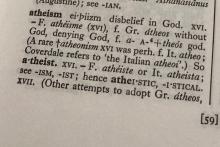Atheism and Abrahamic Religions: Philosophical and Anthropological Approaches
Atheism is an important but sometimes neglected topic in the study of religion. This module suggests that theism and atheism in the modern context can be understood in a symbiotic relationship with one another. It explores the idea that studying the philosophical and intellectual arguments made by (or about) atheists, including popular ones, alongside studying the social experiences of atheists can enable a deeper academic understanding of the phenomenon as a whole. Throughout the module, our aim will be to look at philosophical texts with an anthropological perspective and the anthropological texts with philosophical questions in mind.
This module will start by critically discussing a number of modern popular books written by atheists promoting atheism, originally from Jewish, Christian, and Muslim traditions. Reading these texts, we will outline the popular arguments made in favour of atheism, such as the question of evil, freedom, and tension between science and religion. Along with these texts, we will also look at popular writers who have sought to refute these arguments in a direct form, enabling students to assess elements of truth-claims and competing argumentation. We will also examine scholarly assessments of the debate as a whole. We will also try to contextualize atheism in its social, cultural, historical, political, and religious contexts, and we will discuss the kind of relationship atheism has to existing religious traditions. We will ask whether atheism can be understood as independent of ‘religion,’ and if not, in what ways it is dependent on ‘religion.’ The following two sessions will try to understand atheism from the perspective of lived experience, looking at elements of practice and ritual, and exploring whether atheists can be considered a (religious?) community.
For further information please contact Professor Esra Ozyurek.
